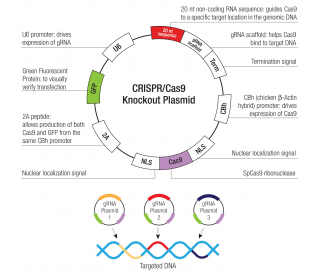Species Reactivity
Mouse
Specificity
Detects mouse CD27 Ligand in direct ELISAs and Western blots. In direct ELISAs, approximately 10% cross-reactivity with recombinant human CD27 Ligand is observed.
Source
Polyclonal Goat IgG
Purification
Antigen Affinity-purified
Immunogen
S. frugiperda insect ovarian cell line Sf 21-derived recombinant mouse CD27 Ligand/TNFSF7
Gln47-Pro195
Accession # O55237Formulation
Lyophilized from a 0.2 μm filtered solution in PBS with Trehalose. *Small pack size (SP) is supplied as a 0.2 µm filtered solution in PBS.
Endotoxin Level
<0.10 EU per 1 μg of the antibody by the LAL method.
Label
Unconjugated
Applications
Recommended
ConcentrationSample
Western Blot
0.1 µg/mL
Recombinant Mouse CD27 Ligand/TNFSF7 (Catalog # )
Neutralization
Measured by its ability to neutralize CD27 Ligand/TNFSF7-induced proliferation in mouse splenic T cells. The Neutralization Dose (ND 50) is typically 3-12 µg/mL in the presence of 10 µg/mL Recombinant Mouse CD27 Ligand/TNFSF7 and sub-optimal amounts of Mouse CD3 epsilon Monoclonal Antibody.
Please Note: Optimal dilutions should be determined by each laboratory for each application. are available in the Technical Information section on our website.
Data Examples
Neutralization | Cell Proliferation Induced by CD27 Ligand/TNFSF7 and Neutralization by Mouse CD27 Ligand/TNFSF7 Antibody. In the presence of sub-optimal amounts of Mouse CD3 epsilon Monoclonal Antibody (Catalog # ), Recombinant Mouse CD27 Ligand/TNFSF7 (Catalog # ) stimulates proliferation in mouse splenic T cells in a dose-dependent manner (orange line). Under these conditions, proliferation elicited by Recombinant Mouse CD27 Ligand/TNFSF7 (10 µg/mL) is neutralized (green line) by increasing concentrations of Goat Anti-Mouse CD27 Ligand/TNFSF7 Antigen Affinity-purified Polyclonal Antibody (Catalog # AF783). The ND50 is typically 3-12 µg/mL. |
Preparation and Storage
Reconstitution
Reconstitute at 0.2 mg/mL in sterile PBS.
Shipping
The product is shipped at ambient temperature. Upon receipt, store it immediately at the temperature recommended below. *Small pack size (SP) is shipped with polar packs. Upon receipt, store it immediately at -20 to -70 °C
Stability & Storage
Use a manual defrost freezer and avoid repeated freeze-thaw cycles.
12 months from date of receipt, -20 to -70 °C as supplied.
1 month, 2 to 8 °C under sterile conditions after reconstitution.
6 months, -20 to -70 °C under sterile conditions after reconstitution.
Background: CD27 Ligand/TNFSF7
CD27 ligand (CD27L), also named CD70, is a type II transmembrane glycoprotein belonging to the TNF superfamily (TNFSF) and has been designated TNFSF7 (1, 2). Mouse CD27L cDNA encodes a 195 amino acid (aa) residue protein with a 23 aa N-terminal cytoplasmic domain, a 21 transmembrane domain and a 151 aa C‑terminal extracellular domain. Mouse and human CD27L share approximated 56% aa sequence identity. By analogy to other TNFSF ligands, CD27L is expected to exist as non-covalent homotrimers. The expression of CD27L is highly regulated at the transcription and posttranslational level (3). CD27L cell surface expression is induced by antigen receptor activation in B cells and at low levels in mouse T cells. Although CD27L expression is not detected on human dendritic cells (DC), membrane expression on mature mouse DCs has been reported. CD27L expression is also present in the thymus medulla in both human and mouse. CD27L interacts with CD27, a member of the TNF receptor superfamily that is expressed on natural killer (NK) cells and subsets of T and B cells (2, 4, 5). Ligation of CD27 on T cells provides costimulatory signals that are required for T cell proliferation, clonal expansion, and the promotion of effector T cell formation (2). Ligation of CD27 on mouse B cell has been shown to inhibit terminal differentiation of activated B cells into plasma cells and enhances commitment to memory B cell responses (5, 6). On NK cells, ligation of CD27 induces proliferation and IFN-gamma production (4).
References:
Hitzen, R.Q. et al. (1994) Immunol. Today 15:307.
Croft, M. (2003) Nature Reviews Immunol. 3:609.
Tesselaar, K. et al. (2003) J. Immunol. 169:33.
Takeda, K. et al. (2000) J. Immunol. 164:1741.
Kobata, T.S. et al. (1995) Proc. Natl. Acad. Sci. USA 92:11249.
Raman, V.S. et al. (2003) J. Immunol. 171:5876.
Entrez Gene IDs:
970 (Human); 21948 (Mouse)
Alternate Names:
CD27 Ligand; CD27-L; CD27LCD27 ligand; CD27LG; CD70 molecule; CD70; Ki-24 antigen; surface antigen CD70; TNFSF7; TNFSF7CD70 antigen; tumor necrosis factor (ligand) superfamily, member 7; Tumor necrosis factor ligand superfamily member 7










